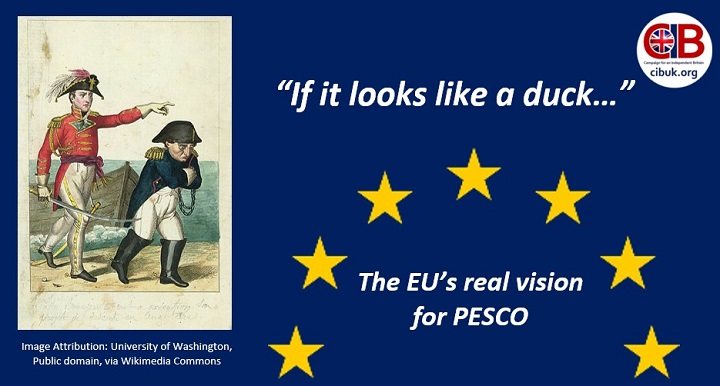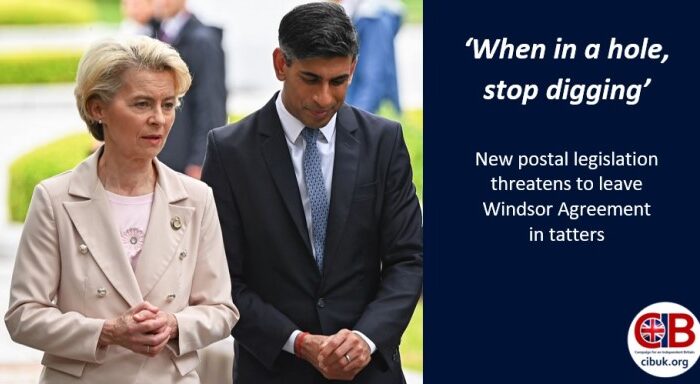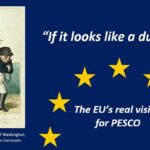“If it looks like a duck…” – The EU’s real vision for PESCO

Whether defending its borders, controlling its member states or extending its power and reach as far as possible, the insatiable ambition of the EU to promote its own self-interest regardless of the impact on others is clear for all to see.
Nowhere is this truer than in the EU’s pursuit of a common defence and security policy.
PESCO (Permanent Structured Co-operation) is the latest in a series of geo-political ambitions dreamt up in Brussels which if left unchallenged threatens to undermine the Western alliance itself.
We are indepted to Gwythian Prins, research professor at the London School of Economics and a member of the Chief of the Defence Staff’s Strategic Advisory Panel for his analysis on events leading up to the formation of PESCO and the implications for the UK in signing up to the EU’s military mobility project which threatens to keep Britain in ‘high dyanmic alignment’ with wider EU defence rules.
We enclose the author’s summary below as well as a link to the full in-depth research article which supports it.
Protecting UK National Security from PESCO:
The EU’s Most Daring Hostile Post-Brexit Ploy
By Gwythian Prins
Evolution of PESCO
PESCO (Permanent Structured Cooperation) with an emphasis on the P, is evolving into an EU Defence Union that is now positioning for a reverse take-over of NATO. Nothing could be more dangerous to UK national security, to continental European security and to the global Free World, in time of grey and hot war.
British Ministers are incorrectly briefed. They are stating that it is possible and safe for the UK to dine à la carte in PESCO. This is not so. Like the devil, EU initiatives always dance through the details. The sotto voce battle cry of Brussels is: il n’y a que texte: he who controls the details, wins.
A detailed evidence-based report being published simultaneously on Briefings for Britain, which builds upon oral evidence before the European Scrutiny Select Committee on 17th May 2023, documents the history and the mechanics of PESCO. It also shows on the facts how enticement of the UK into subordination via the Military Mobility project involves binding commitments which would keep the UK in “high dynamic alignment” with EU rules.
EU ‘bait and hook’ strategy
The EU tactic revealed is one of ‘bait and hook’. In this, it resembles other arms of this interconnected strategy, for preeminent example the Northern Ireland Protocol/’Windsor Agreement’ and the HORIZON science funding programme.
European power shift eastwards
The context for this is a geopolitical turning-point of immense significance. The centre of power in the EU is shifting inexorably from Paris to Warsaw, by-passing Berlin. Its momentum is accelerated by the return of large-scale war to Europe for the first time since 1945 and by the implosion of social control during the worst civil violence since 1967-68 in France. For the first time in a lifetime, this dynamic is not under US control; and current trends are actively contrary to the wishes of President Biden. His recent actions over NATO leadership, confirm this.
Because it retains abundant ‘firm’ power, eschewing the snares of ‘greenery’ and relying on fossil fuels while preparing for nuclear energy, Poland is rapidly emerging as the Continent’s most economically prosperous and secure state. This underpins its emerging status as the Continent’s leading military land power, along with battle-hardened Ukraine: the two major armies between the UK and Putin’s Russia.
The Baltic states naturally gravitate towards this new Continental centre and so does Scandinavia, whose newly active alignment in NATO is the other major geopolitical fact of recent times in Europe, making the Baltic a NATO sea. Putin has achieved this, which nothing and no-one else could previously do.
For cultural and military reasons this new alignment looks to the UK for support and direction, not least because of our leading role in Five Eyes. Thus, the UK must nerve itself. Monumental active choices beckon in a whole-hearted exercise of independent sovereign power. Brexit opened the door to this, as witnessed by the UK lead in supporting Ukraine with three key interventions since early 2022.
But forty years of living as a member state within Mr Barroso’s European Union ’empire’ (soi disant) have so atrophied the mental sinews of the British administrative and political classes that, now that the door to the cage has been opened, the canary dares not fly out to greet the sun of restored national sovereignty, but is dazzled and, blinking fearfully, prefers the familiarity of life as a willing captive, merely embellishing Brussels legislation. This is a real and present threat to UK security. Why?
French revanchism
Because, since 2016 and aware of their fading influence, Paris and Brussels have been aggressively seeking to revalidate the legitimacy of the French vision of federal union on firmer ground. That chosen ground is the most fundamental: defence and security. The instrument is PESCO.
It is imperative that UK Ministers understand the dynamics documented in the long report and avoid the hooks built into PESCO; that they raise their eyes and ambitions eastwards in order to preserve NATO correctly, to engage pro-actively with the emerging Poland-centred alliance, and that they cease to believe that they can safely dine à la carte in Hôtel PESCO, when re-subordination of our newly restored sovereignty is the obligatory plat du jour, and where, like at Hotel California (which I have previously visited for BfB), the Night Manager says that you can check out any time you like but you can never leave. This is not a drill.
By Gwythian Prins, professor emeritus at the London School of Economics – 09/07/23

‘The Independence Documentary’
Together with our partners at Facts4EU.Org, we’ve organised a TV-style documentary with a stellar line-up of well-known politicians and all kinds of interesting people, young and old, men and women, white and ethnic origin, presented by Alexandra Phillips. Alex will be known to many readers as an ex-GB News presenter and a frequent sight on everything from Question Time to Talk TV. We have finished filming – now we have the long task of editing, if we can get some extra funding. This is going to be big!
Please help today if you can: click here to read more
About the author: Gwythian Prins is emeritus research professor at the LSE, a former Nato adviser, and author of ‘Protecting UK National Security from PESCO’, published by Briefings for Britain this week
The original article can be found here.
CIBUK thanks its Affiliated Organisation Briefings for Britain for permission to republish this article.
Main Image: montage © CIBUK 2023




